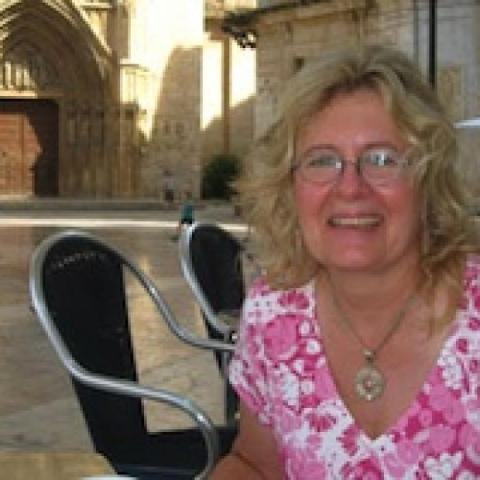
Carrie Douglass
Ph.D. University of Virginia 1987
Specialties
Cultural anthropology; symbolic anthropology; Spain; the Mediterranean; European anthropology; ritual cycles; demography; reproduction; gender; marriage and the family; medical anthropology; transnational kinship; nationalism and ethnicity; art in small-scale cultures; animals (Good to Think).
Most of my work in socio-cultural anthropology has been in Spain. Before I began graduate school in symbolic anthropology, I had lived in Spain for eight years. This early experience with Spain, especially Barcelona, complemented my later field work there. My first book, Bulls, Bullfighting and Spanish Identities (University of Arizona Press, 1997), used bullfighting as a vehicle to explore the many Spanish national and local identities as made manifest through patron saint festivals, the main context for bullfights and other taurine spectacles. Spain has a long history of center-periphery tension. Although it has existed as a state for five hundred years, nationhood has always been contested. Fiestas become "models for" rather than "models of" identity. Bullfights, called the "fiesta nacional" by many with a conservative vision of "Spain," are often challenged, and rejected, and ignored by more "progressive" and "European" Spaniards, as well as by those groups that claim a different nationhood (Catalan, Basques, etc).
Later in my career, I became startled by the phenomenon of low fertility occurring in Spain in the 1990s and beyond. In the late 1990s, Spain, along with Italy, two countries with traditionally large families, had the lowest birthrates in the history of humankind. In 2000 I spent a year doing field work in five cities across Spain, interviewing groups of "young people" as well as "their parents." This work later resulted in my edited book, Barren States: the Population 'Implosion' in Europe, (Berg) with contributions from ten other anthropologists of Europe, two of whom were University of Virginia graduate students. We contextualized the demography of lowest fertility in post-modern, neo-liberal Europe and described how, despite the many and divergent paths, all of the European states had eventually arrived at low fertility. From the perspective of the state, low fertility implies shrinking populations. This in turn spurs states to replace population loss with immigrant labor, which often provokes a threatened sense of identity in European countries, resulting in a nationalist backlash and sometimes violence. The articles in the book discuss the reactions to all this from the ethnographic perspective of the "ground up," and why and how childbearing gets postponed, and reduced. This book was named the Most Notable Recent Collection by the Council on the Anthropology of Reproduction (Society of Medical Anthropology) in 2006.
In 2007 I co-authored with my husband, Fernando Operé, Los españoles y la España de Hoy: Historia, sociedad, y cultura, (Prentice Hall), a text written in Spanish and for use in college Spanish Culture and Civilization classes.
Recently, my interests have become more local and more personal. I am in the process of writing a book on Thomas Jefferson and horses. By all accounts, Jefferson was a superb horseman, and rode daily until his death at age eighty-three. I am examining Mr. Jefferson in the context of horse culture in colonial and post-colonial Virginia, as new kinds of horses (the emerging Thoroughbred breed) were imported into the colonies from England. Jefferson and his neighbors promoted and participated in this exchange, and the buying and selling and breeding of horses followed elite dynastic lines among the landed gentry of 18th century Virginia. As a long-time Charlottesvillian and horsewoman, myself, Jefferson's shadow from the "Mountain" falls long upon all of us.
Selected Publications
2007 - From Duty to Desire: Emerging Adulthood and its Consequences in Europe. Journal of Child Development Perspectives, Society for Research in Child Development (SRCD) 1 (2):101-108.
2007 - Los españoles y la España de Hoy: Historia, sociedad, y cultura. (With Fernando Operé). Prentice Hall, Upper Saddle River: New Jersey.
2005 - Barren States: The Population Implosion in Europe. Berg: Oxford.
1997 - Bulls, Bullfighting, and Spanish Identities. University of Arizona Press.
1992 - Europe, Spain, and the Bulls. Journal of Mediterranean Studies (1):69-79 1991 - The Spanish Fiesta Cycle Anthropological Quarterly 64(3): 126-141, July.
1985 - VAMOS (With Kenneth Chastain and Fernando Operé). Heinle and Heinle, Boston.
1984 - Toro muerto, vaca es: an Interpretation of the Spanish Bullfight. American Ethnologist 11 (2): 242-258.